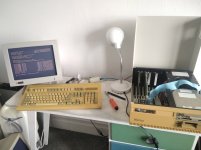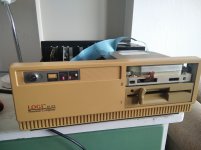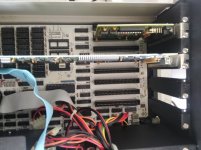kdr
Experienced Member
So this is a real head-scratcher...
I recently acquired a Logicraft 88-XT machine, which is a generic Turbo XT system with 640K of RAM and an NEC V20 processor (in a socket labelled "8088-2") that runs at either 4.77Mhz or 8Mhz. I can't find schematics or a manual for this machine, but the turbo switch appears to select between a 14.318180Mhz crystal and a 24.0Mhz crystal. [Not an XCO.]
I dropped in a known-good ST11R controller paired with a known-good ST-238R drive, did a brand new low-level format, installed MS-DOS 3.30, and everything was going fine until at some point I edited C:\CONFIG.SYS while in turbo mode. No errors or anything until after rebooting, when the system just failed to boot from the hard drive at all. CHKDSK from a MS-DOS 3.30 boot floppy spewed forth hundreds of errors, entire allocation chains were lost and IO.SYS / MSDOS.SYS were truncated, filenames were randomly corrupted, etc.
Twice more I formatted and reinstalled DOS. Both times everything was working perfectly, with lots of disk reading and writing and copying of files, until I would absentmindedly reboot and forget to switch out of turbo mode (the default). At which point the root directory and the FAT would get corrupted again.
Occasionally, even just reading from the disk in turbo mode would return incorrect data. Confirmed through the use of MD5SUM.EXE -- in normal mode the checksum was always correct, but in turbo mode the checksum was always wrong -- and each run through MD5SUM would return a different (but still incorrect) checksum. I created a RAM disk (RAMDRIVE.SYS) and confirmed that even in turbo mode, file checksums from the RAM disk were correct.
Finally, and most perplexingly... Norton Disk Doctor 4.5 and SpeedStor 6.03 are both returning perfect results... even in turbo mode! I am about an hour into torturing the disk with Spinrite II's most aggressive pattern test, again in turbo mode, and again without observing even a single error yet.
Any suggestions on what to try next?
Is it possible there is some marginal RAM located exactly where DOS puts its disk buffers? [But if there is bad RAM, the RAM disk test ought to have failed as well, right?]
Perhaps Disk Doctor and friends are bypassing the BIOS routines and submitting commands directly to the ST11R controller? And therefore could it be some mysterious timing-related bug in MS-DOS 3.30 or in the BIOS?
I recently acquired a Logicraft 88-XT machine, which is a generic Turbo XT system with 640K of RAM and an NEC V20 processor (in a socket labelled "8088-2") that runs at either 4.77Mhz or 8Mhz. I can't find schematics or a manual for this machine, but the turbo switch appears to select between a 14.318180Mhz crystal and a 24.0Mhz crystal. [Not an XCO.]
I dropped in a known-good ST11R controller paired with a known-good ST-238R drive, did a brand new low-level format, installed MS-DOS 3.30, and everything was going fine until at some point I edited C:\CONFIG.SYS while in turbo mode. No errors or anything until after rebooting, when the system just failed to boot from the hard drive at all. CHKDSK from a MS-DOS 3.30 boot floppy spewed forth hundreds of errors, entire allocation chains were lost and IO.SYS / MSDOS.SYS were truncated, filenames were randomly corrupted, etc.
Twice more I formatted and reinstalled DOS. Both times everything was working perfectly, with lots of disk reading and writing and copying of files, until I would absentmindedly reboot and forget to switch out of turbo mode (the default). At which point the root directory and the FAT would get corrupted again.
Occasionally, even just reading from the disk in turbo mode would return incorrect data. Confirmed through the use of MD5SUM.EXE -- in normal mode the checksum was always correct, but in turbo mode the checksum was always wrong -- and each run through MD5SUM would return a different (but still incorrect) checksum. I created a RAM disk (RAMDRIVE.SYS) and confirmed that even in turbo mode, file checksums from the RAM disk were correct.
Finally, and most perplexingly... Norton Disk Doctor 4.5 and SpeedStor 6.03 are both returning perfect results... even in turbo mode! I am about an hour into torturing the disk with Spinrite II's most aggressive pattern test, again in turbo mode, and again without observing even a single error yet.
Any suggestions on what to try next?
Is it possible there is some marginal RAM located exactly where DOS puts its disk buffers? [But if there is bad RAM, the RAM disk test ought to have failed as well, right?]
Perhaps Disk Doctor and friends are bypassing the BIOS routines and submitting commands directly to the ST11R controller? And therefore could it be some mysterious timing-related bug in MS-DOS 3.30 or in the BIOS?



